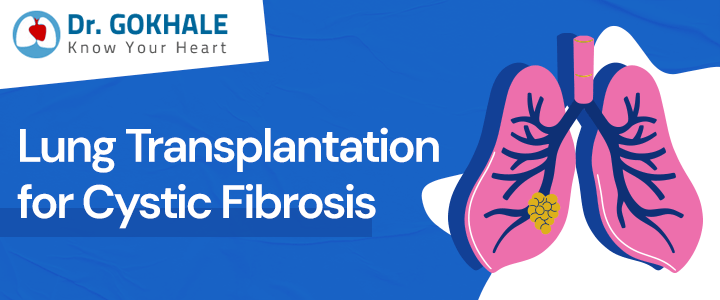Cystic Fibrosis Lung Transplantation becomes a critical treatment option when this inherited disorder leads to serious complications. Cystic fibrosis causes thick, sticky mucus to build up in the lungs and digestive tract, leading to frequent respiratory infections, breathing difficulties, digestive issues, weight loss, liver problems, and infertility. As the disease progresses, it can result in severe lung damage and respiratory failure. Since cystic fibrosis is a genetic condition passed down from parents, children can suffer significantly if not diagnosed and treated early. In advanced stages, lung transplantation offers a chance for improved quality of life and longer survival.
There is no cure for cystic fibrosis, but with the right care, symptoms and complications can be effectively managed. In this blog, we’ll dive into this serious condition, explore its origins, understand its symptoms, and look at lung transplants as a potential treatment for cystic fibrosis.
Cystic Fibrosis: How Does It Happen?
Cystic fibrosis is caused by a genetic mutation in the CFTR gene. This mutation results in the production of thick and sticky mucus, which builds up primarily in the lungs and pancreas, but can also affect other areas.
The abnormal mucus clogs the airways, leading to difficulty breathing and an increased risk of respiratory infections. Over time, this build-up in the lungs causes chronic inflammation, scarring, and even irreversible lung damage.
In short, the overproduction of mucus in the lungs creates a domino effect that gradually affects almost every organ in the body.
Cystic Fibrosis Lung Transplantation: Understanding the Complications and When It’s Needed
- The thick, sticky mucus in cystic fibrosis blocks the pancreas’ ducts, preventing digestive enzymes from reaching the intestines. This blockage leads to poor digestion, reduce absorption of nutrients weight loss, and overall malnutrition.
- The build-up of mucus in the liver can result in chronic inflammation and scarring which can potentially lead to impaired liver function and liver diseases.
- In few cases, cystic fibrosis causes a blockage in the vas deferens which prevents sperm from reaching the urethra. In women, thickened cervical mucus makes it harder for sperm to pass through the cervix leading to conception difficulties.
- Due to the increased strain on the lungs from mucus build up, the heart will need to work harder to pump blood through the lungs. Over time, this can lead to heart complications also.
Cystic Fibrosis: Lung Transplantation as Treatment Option
Chest physiotherapy, medications, pancreatic enzyme supplements for digestion, and even gene therapy are some common treatment options for cystic fibrosis. These help manage symptoms and improve the overall condition. In severe cases where the lungs are severely damaged, and standard treatments fail to improve quality of life, a lung transplant is another effective treatment option.
When is Lung Transplantation Considered?
Lung transplantation is recommended for cystic fibrosis patients when lung function drops to less than 30% of normal capacity. According to Dr. Alla Gopala Krishna Gokhale, a lung transplant surgeon in Hyderabad, frequent and severe lung infections, respiratory failure, and a regular need for oxygen therapy are also indicators that a lung transplant may be necessary.
Lung Transplantation and Its Benefits for Cystic Fibrosis
Treatment in a lung transplant, one or both lungs are replaced with healthy lungs from a donor. Double lung transplants are more common in cystic fibrosis because both lungs are usually affected. “A lung transplant can provide a fresh lease on life for cystic fibrosis patients, improving breathing, enhancing quality of life, and, in successful cases, extending life by years, even decades,” says Dr. Gokhale.
However, it’s important to note that while a lung transplant can significantly extend life and improve quality, it is not a cure for cystic fibrosis. With proper medical support, it can offer a chance at a better, longer life. If you’re in Hyderabad and seeking more information about lung transplants for cystic fibrosis, Dr. Alla Gopala Krishna Gokhale is one of India’s top lung transplant surgeons, known for his remarkable success record. You can contact him here.
 Ask Doctor
Ask Doctor
